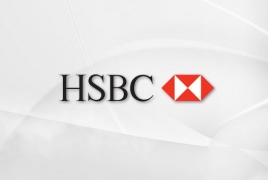HSBC ordered to pay 40mln Swiss francs over money-laundering claims June 4, 2015 - 20:45 AMT PanARMENIAN.Net - HSBC has been ordered to pay a record 40mln Swiss francs and been given a final warning by the Geneva authorities for “organizational deficiencies” which allowed money laundering to take place in the bank’s Swiss subsidiary, the Guardian reports. The settlement means the Swiss will not prosecute HSBC or publish the findings of their the probe into alleged aggravated money laundering. But Geneva’s chief prosecutor, Olivier Jornot, cautioned that the bank was on notice, saying: “This is an excuse which will only apply once.” Announcing the biggest financial penalty ever imposed by the Geneva authorities, Jornot launched a stinging attack on his own country’s financial laws, adding his voice to a growing a number of Swiss politicians and campaigners calling for reform of the country’s secretive banking system. “This matter shows the weakness of Swiss law in the matter of entry of criminal funds into the financial system,” said Jornot. “When we have a law that doesn’t punish financial intermediaries accepting doubtful funds then we have a problem. This problem dates from long before the HSBC affair.” HSBC agreed to the settlement after being notified of the charges being prepared against it at a private meeting on 10 April following which, prosecutors claimed, the bank rapidly agreed to begin negotiations over financial damages for past “illegal acts”. The Geneva authorities said the payment, which is being described as “compensation” rather than a fine, was in line with the profits obtained by HSBC from processing illicit funds. “This matter shows the weakness of Swiss law in the matter of entry of criminal funds into the financial system,” said Jornot. “When we have a law that doesn’t punish financial intermediaries accepting doubtful funds then we have a problem. This problem dates from long before the HSBC affair.” HSBC agreed to the settlement after being notified of the charges being prepared against it at a private meeting on April 10 following which, prosecutors claimed, the bank rapidly agreed to begin negotiations over financial damages for past “illegal acts”. The Geneva authorities said the payment, which is being described as “compensation” rather than a fine, was in line with the profits obtained by HSBC from processing illicit funds, according to the Guardian. In a statement, HSBC said: “The investigation conducted by the public prosecutor of the canton of Geneva into HSBC Private Bank (Suisse) has been formally closed today. The investigation found that neither the bank nor its employees are suspected of any current criminal offences. The Geneva prosecutor acknowledges the progress the bank has made in recent years, including the improvements in its compliance function, internal processes and technology.” HSBC claims to have undergone a radical transformation, with initiatives designed to prevent its banking services being used to evade taxes or launder money. The repositioning has reduced its client base by almost 70%, from about 30,000 accounts in 2007 to some 10,000 in 2014. Explaining the decision not to bring HSBC to court, Jornot said Swiss law demanded a high burden of proof. Those laundering money had to be shown to be doing so deliberately, not accidentally, and the money had to be demonstrably obtained from criminal acts, not simply deposited by a known criminal. To fine the bank, prosecutors would also have needed to show organizational failure caused the money to be laundered. In addition, many of the revelations in Falciani’s data, which gave a detailed picture of events at the bank between 2005 and 2007, concerned older accounts or people who were no longer clients of the bank. Nonetheless, Jornot stressed that the evidence showed “HSBC has suffered from organisational failings which were to blame for the money laundering which occurred”. Yerevan has dismissed Turkey’s demand to shut down the Armenian nuclear power plant as “inappropriate”. Armenia will loan 2.9 billion drams to Nagorno Karabakh (Artsakh), according to a draft government decision. The Ministry of Ecology and Natural Resources of Azerbaijan has “strongly condemned” Armenia’s decision. Kerobyan has said that for the first time in the history of Armenia, the volume of foreign direct investments amounted to about $1 billion. Partner news |